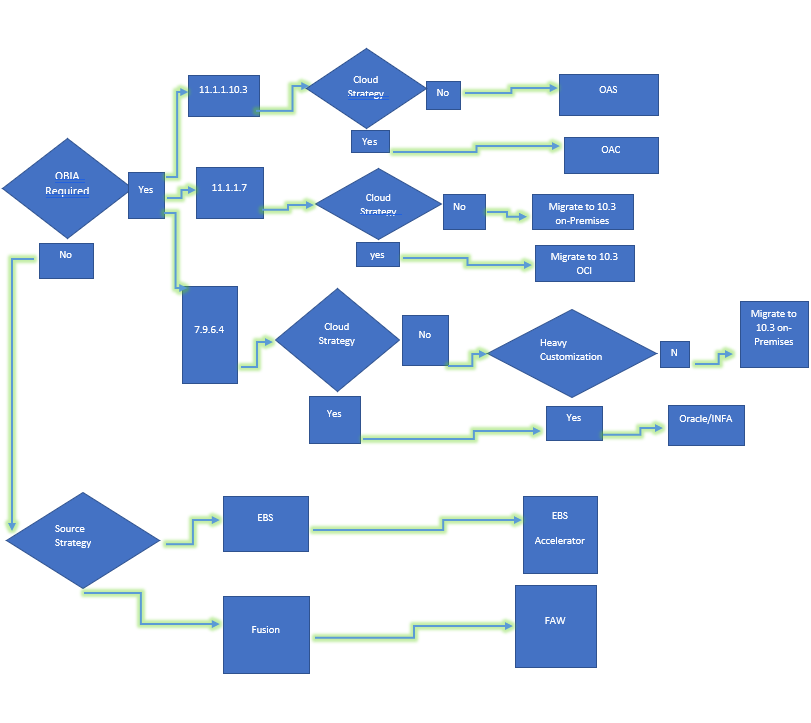Overview
Oracle Business Intelligence Applications (OBIA enables organizations to gain insights and greater value from a range of data sources, including Oracle on-premises Applications Unlimited (E-Business Suite, PeopleSoft, JD Edwards, and Siebel), Oracle SaaS Applications (HCM Cloud, ERP Cloud, SCM Cloud, and CX Cloud) and non-Oracle sources via custom integration or Oracle BI Applications Universal Adaptors.
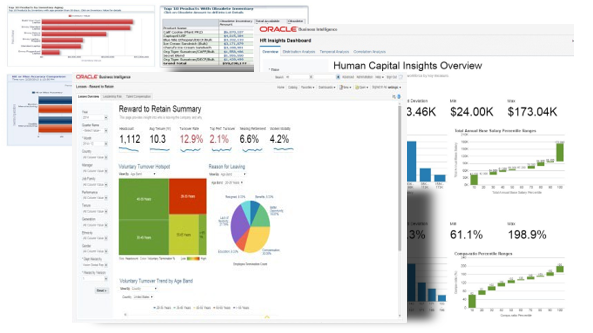
Oracle has a huge number of customers who have invested years into Oracle BI Applications (OBIA). The enterprise data warehouse and the dashboards delivered by OBIA have gained a lot of trust from business users. Many customers have further extended the use of Oracle BI Apps by customizing and extending the ETL, data models, reports, and dashboards. Existing customers are on either of the two versions of OBIA 7.9.6XX (informatica based) or 11g/12c ODI based.
In the light of the latest released Oracle’s product direction and roadmap of Oracle Business Intelligence Applications, many customers have been confused and left wondering how to stay on supported path and continue to enjoy the investment in OBIA. This blog is intended to assist customers plan and align short to long term goals with Oracle’s OBIA product direction. The blog provides overview in form of answering some the frequently asked questions from existing OBIA customers.
What is Oracle’s OBIA Product Strategy?
Oracle released OBIA statement of direction (latest version 2022 08) states that the solution is mature and “content complete”, meaning analytic coverage currently exists for most use cases. The impact to existing customers is they will receive on-going support on their OBIA investment however no further OBIA product features or enhancements are planned to include features or enhancements related to the database schema, ETL mappings, BI semantic model Subject Areas, analyses, reports or dashboards or support for additional data sources.
The Oracle Statement of Direction for OBIA clarify that release, 11.1.1.10.3, will be the point release and will be supported at least through 2030
Can we Purchase new licenses?
The OBIA product SKUs are on controlled Availability meaning no “net new” licenses to be sold. For example, an HR licensed customer is restricted from a new Financial Analytics license. New customers seeking OBIA licenses should consider next generation of analytical applications.
What is OBIA’s Road map?
The Oracle BI Applications roadmap provides a lengthy support window allowing customers to continue leveraging their significant investments in Oracle BI Applications. Below is an overview of the release Roadmap.
- 11.1.1.10.3 PS2: Dec 2021
- 11.1.1.10.3 PS3: July 2022
| OBIA version(s) |
Premier Support |
Extended Support |
Sustaining Support |
| 11.1.1.10.3 |
Dec 2031 |
Unavailable |
Indefinite |
| 11.1.1.10.2 |
Expired |
July 2022 |
Indefinite |
| 11.1.1.10.1 |
Expired |
Expired |
Indefinite |
| Earlier versions |
Expired |
Expired |
Indefinite |
Premier Support for OBI 7.9.6.X has ended. How do we get back on support?
Oracle BI Applications customers currently deployed on 7.9.x Informatica ETL based releases, whose premier support ended-on Jan 2018, can consider two options below.
- Review if OBIA is still required, then evaluate the organization’s strategy around applications (cloud vs On-prem) – Upgrade platform components and upgrade to the latest supported analytic application (OBIA, EBS Accelerator and FAW) – OBIA upgrade requires conversion of Informatica ETL code to ODI based. Benefits for upgrading include Improved Architecture, new content, Improved performance, Cloud Compatibility and Lower TCOs.
- For Organizations that have built, customized, or enhanced a huge volume of complex mappings in Informatica, and their business relies highly on the data populated by these ETL jobs in the enterprise data warehouse. Consider platform upgrade and take advantage of Oracle + Informatica Partnership to Migrate to OCI. Oracle has partnered with Informatica for enterprise cloud data integration for data warehouse and lake house solutions. This solution provides OBIA customers with flexibility and control over their data both hybrid and multi-cloud environments. Please see the reference diagram showing the OBIA migration concept
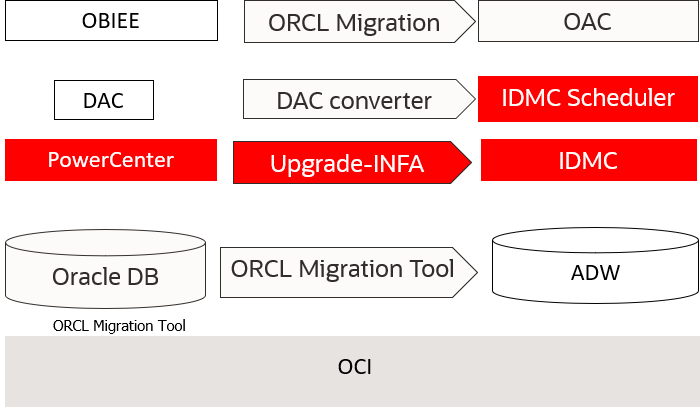
How about OBIA 11g Upgrade Options?
Oracle BI Applications 11g customers are strongly encouraged to upgrade to the new release 11.1.1.10.3 PS3 before June 2023.
Oracle advises customers to evaluate Oracle’s next generation of analytic applications. Oracle’s long term analytics application strategy is in the Oracle Fusion Analytics Warehouse (FAW) product line. Oracle currently has ERP and HCM versions of Fusion Analytics Warehouse in the market and has an extensive roadmap to build versions sourcing from Supply. It is very important to note that Fusion Analytics Warehouse is not an upgrade of the existing Oracle BI Applications but rather an independent new product line of targeted analytical applications for Oracle SaaS customers.
What are the hardware recommendations?
Hardware recommendations are primarily for ensuring ETL performance and scalability. The table below summarizes hardware recommendations by target volume ranges.
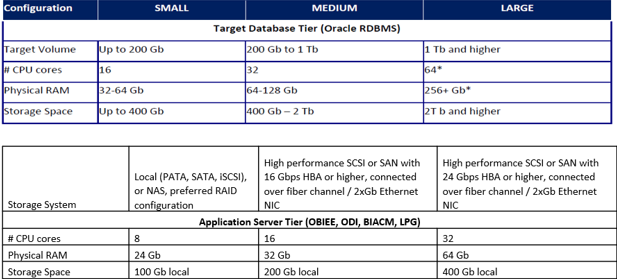
What are the deployment Options?
Oracle BI Applications are supported on premises, in the cloud or in hybrid deployments. Customers are generally advised to uptake the latest versions of platform to take advantage of new features, enhancements, and fixes. On-premises solutions are deployed leveraging Oracle BI Foundation Suite, Oracle Data Integrator and Oracle Database. (Figure 1)

Hybrid solutions deploy the BI semantic model, analyses and dashboards on Oracle Analytics Cloud with Oracle Data Integrator and Oracle. Database remaining on premises. (Figure 2)
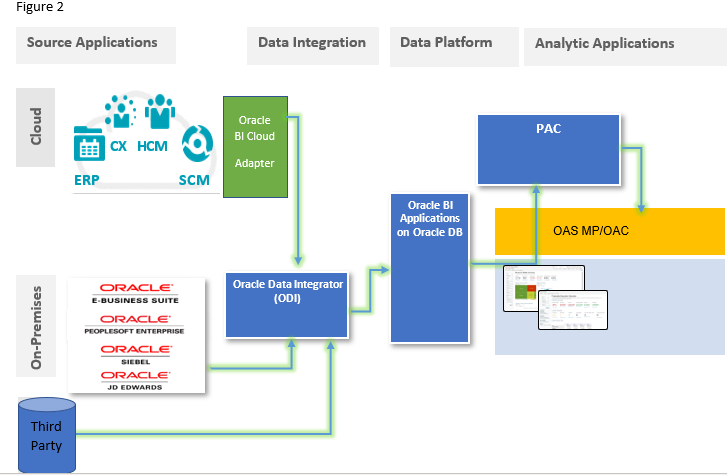
Cloud solutions are deployed on Oracle Analytics Cloud, Oracle Compute hosting Oracle Data Integrator, the Oracle BIApplications Configuration Manager and Oracle Database Cloud Service. See detailed deployment documentation published on Oracle Support. (Figure 3)
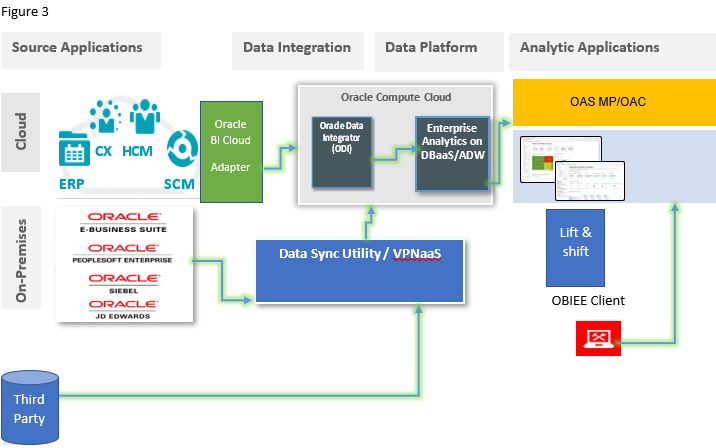
How About platform and data source certification?
While OBIA will not have new content and enhancements planned, Oracle will actively support the products in accordance with its Lifetime Support Policies including certification of operating systems, infrastructure, cloud and on premises platform components. Oracle will continue to certify new Oracle SaaS application and Oracle Applications Unlimited version data sources.
How complex is the upgrade process?
OBIA upgrades requires skills and effort in porting, merging, reconciling customizations with semantic layer, Reports and ETL. To conform with configurations and customization best practices, Oracle recommends engaging skilled system integrators.
Customers deployed on 11.1.1.10.2 will experience lowest level of effort to upgrade than customers on earlier versions. Oracle provides upgrade instructions for each version of OBIA. In the absence of a direct migration path, upgrades from the 7.9.6.X to OBIA 11g will be considered a new implementation.
Conclusion
OBIA is content are complete and Oracle has released 11.1.1.10.3 PS3 to support ODI 12c. Oracle plans to certify future platform and infrastructure and data source versions with lifetime support policies with no plans for new content enhancement. OBIA customers are encouraged to evaluate their data and analytic strategy and upgrade to the new OBIA release or next generation of Oracle analytics applications. The Flow chart below can be used as a guide to determine the right solution path for each organization.
